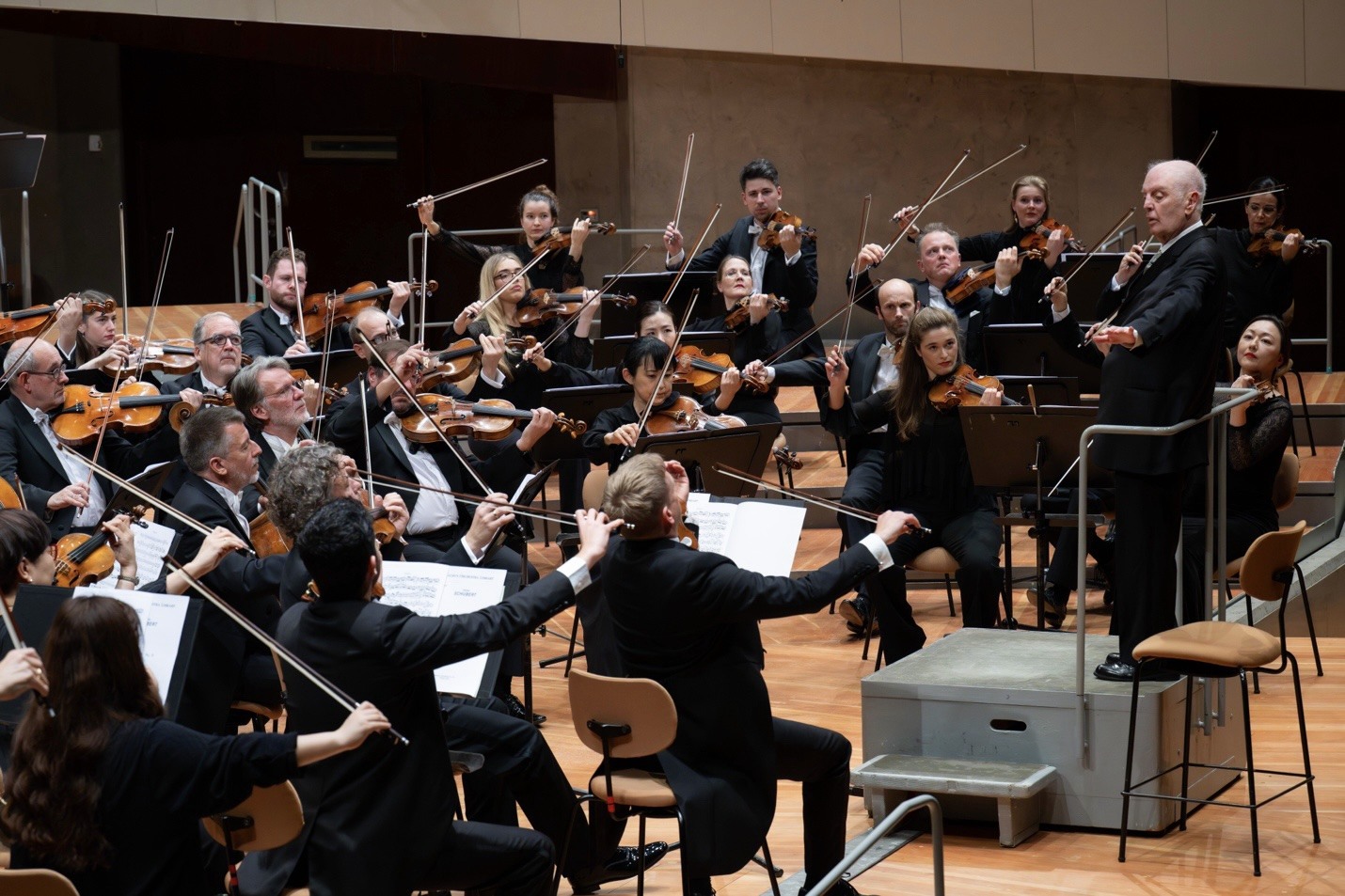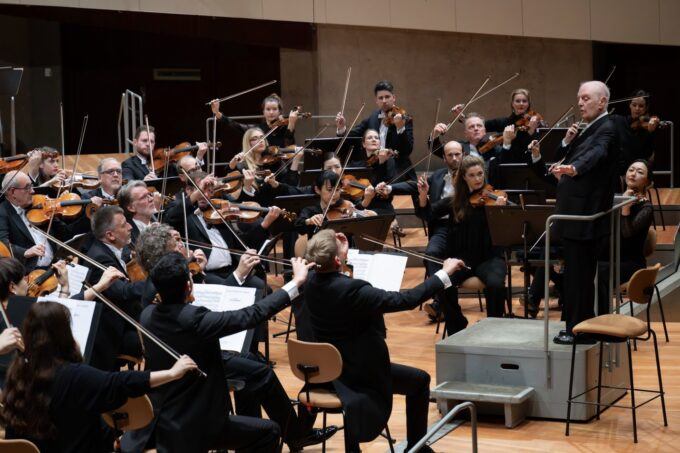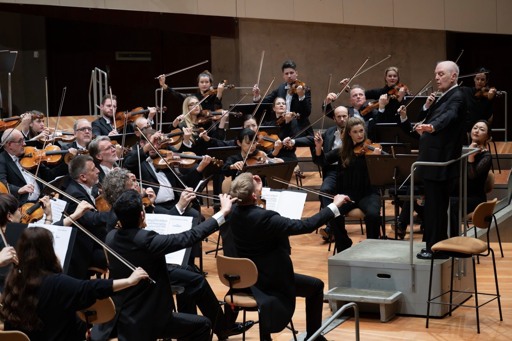

Daniel Barenboim conducts the Berlin Philharmonic on the German Unity Day. Photo: Monika Rittershaus.
The Berlin Wall was breached on the night of November 9th, 1989. The German Democratic Republic was done. East Berliners poured through the suddenly opened border, stood on top of the “Anti-Fascist Protection Rampart” (Antifaschistischer Schutzwall) with Westerners, where they would have been shot down during the nearly four decades since construction on the barrier had begun in the summer of 1961.
The Berlin Philharmonic quickly organized a free concert for East Berliners to take place a couple of days later on the morning of November 12th in their home auditorium, the Philharmonie.
Designed by the celebrated West Berlin architect Hans Scharoun, the concert hall had taken up its position on the front line—culturally and geographically—of the Cold War in a desolate, bombed-out area close to the city’s Russian sector. Construction of the West’s new, exuberantly modern concert hall began in 1960, the year before the border was closed. As the Wall went up, so did the Philharmonie. Once completed three years later, it would be crowned by a stylized eagle, symbol of the Federal Republic. The bird could peer over the Wall to the socialist blocks of East Berlin beyond, and a few hundred meters to the northeast to the Brandenburg Gate, stranded in No Man’s Land.
The night the Wall fell—figuratively, its full-scale demolition began the next spring—Daniel Barenboim was making a recording with the Berlin Philharmonic. Members of the orchestra approached the maestro and proposed the idea of a spontaneous concert. Barenboim agreed, but with two conditions: he would not be paid, and the only ticket for admission would be an East German passport. Even before the sun had risen that Sunday morning, long lines had formed outside the Philharmonie.
Barenboim would not only conduct but also serve as soloist in a program made up of Beethoven’s First Piano Concerto and his Seventh Symphony. The least exuberant, but spiritually most uplifting, of the Symphony’s four movements is the second, marked Allegretto. Its funeral march gives way to transcendence and hope and then returns resolutely to face the fate of great heroes. Throughout the rest of the symphony, exultant dynamism prevails. Wagner called the work the “apotheosis of the dance.” In the immediate aftermath of the fall of the Wall, it not only captured the thrill of unexpected liberation but also joyfully enacted freedom of movement.
In that 1989 concert—available on DVD, on the Berlin Digital Concert Hall, and through glimpses to be snatched from YouTube—Barenboim is pure vitality at the keyboard and at the podium, fingers flying, fists shaking, a heroic figure of vigor and idea. His body commands the music to the depths and raises it up to the heights, poised and imperious, uplifted and uplifting. He directs as much with his elbows, head, eyes, and torso as he does with his baton. It is moving to watch him as he radiates joy and purpose.
The applause when Barenboim enters for the first time is thrilling. The ovation after the symphony concludes the program is volcanic.
As the clapping crests, Barenboim raises his hands to quiet the audience and tells them this is no normal day and no normal concert, and therefore the orchestra will play an encore—Mozart’s Overture to Così fan tutte, which they had been in the midst of recording. The camera searches out people in the audience—amazed, rapt, disbelieving, believing, teary, smiling, entranced, enraptured. The audience’s attire is not dark and serious West Berlin evening concert wear, but Socialist Sunday best—lots of sweaters in the muted Eastern Bloc color spectrum.
A supernova of applause explodes after the last elated chord of the Beethoven. Without permission—none is required—a woman hurries from the audience onto the stage and puts a white carnation into the sweating, smiling Barenboim’s lapel, then begins to hand out flowers to members of the orchestra. Bouquets, still in their cheap plastic wrappers, keep being brought up by people in the audience. No ushers or security guards are there to turn them back. The communal feeling is overwhelming. The ovation wants to go on forever.
A lot of water has flowed under the geopolitical bridge between East and West (and not just Berlin) since that Sunday morning. Thirty-six years on, the Wall has been gone for longer than it stood.
The day of political reunification, October 3rd, 1990, is now a national holiday—Tag der deutschen Einheit / German Unity Day—in the reunited country. On the recent 35th anniversary of the holiday, Barenboim, for many years now the Berlin Philharmonic’s honorary director, returned to the Philharmonie to lead the orchestra in a festive program that concluded, as it did on that Sunday morning in 1989, with Beethoven’s Seventh Symphony.
Barenboim is 82 years old and in poor health, beset by Parkinson’s. In 2023, he decided not to renew his contract as director of Berlin’s State Opera, leaving the post after thirty years because of his worsening condition.
I wondered if any audience member from November 1989 was in the audience this past October 3rd. Like those who have seen him conduct the Philharmonic so often in the intervening years, they would have been shocked and saddened at his decline. In a gently bowed profile, he trudged from the wings, then with mighty effort slowly ascended each of the four steps to the stage. The concertmaster stood at the ready to help him up to the podium.
The welcoming reception from the audience was huge and heartfelt—encouragement, gratitude, and anticipation in equal measure.
The program began with Carl Maria von Weber’s Oberon Overture. Stricken by tuberculosis, Weber disregarded his doctor’s urgent advice and journeyed to London in the spring of 1829 to conduct the work’s premiere. He died a month later while still in England. Given the composer’s fate and Barenboim’s condition, the rising solo horn invocation that opens the overture took on a mortal cast. The ensuing whimsy of the music worked in mournful counterpoint to Barenboim’s halting movements. An overture is intended to start things off—an opera, a suite, a concert. But this one, for all its frivolity, sounded less like a beginning than a valediction.
The opera itself is a European fantasy of the Middle East that Barenboim’s friend and colleague Edward Said shone devastating anti-imperialist light on in his classic 1978 study, Orientalism. In 1999, Said and Barenboim founded the West-Eastern Divan Orchestra, which brings together young musicians from across the Middle East: Egypt, Iran, Israel, Jordan, Palestine, and Syria. For this ensemble, music becomes not only the representation but also the practice of peace.
In 2008, Barenboim became the only person on the planet to hold both an Israeli and a Palestinian passport. He has long called the Israeli occupation of Palestinian lands “disastrous,” and on the website of the Barenboim-Said Akademie issued a statement this past summer that included these lines:
More than 19 months later, we are devastated by the tens of thousands of innocent victims claimed by the atrocious ongoing war on Gaza. I condemn this war in the strongest possible terms, and I also condemn the escalating acts of aggression and violence between Israel, Iran and the USA at the expense of the civilian population.
Little more than a decade after the Berlin Wall came down, another one went up—the so-called West Bank barrier that runs along parts of the Green Line and into Palestinian territory. Barenboim has called this Wall “catastrophic.”
Ten days before the current ceasefire was announced, it was hard not to see in Barenboim’s physical decline a metaphor for the devastations of occupation and the Gaza War.
His body is frail, but his mind remains sharp. Barenboim conducts, as he always has, from memory. He stood alone, no music desk to hold on to, no score in front of him to lean on—either figuratively or physically. The podium has a handrail at the conductor’s back that he used to pull himself up with and, for much of the concert, relied on to stabilize himself with his left hand, while the right made small, often nearly imperceptible movements with the baton, or leaned against when both arms were called to musical action. Even during the exuberant passages that would have previously consumed his physical and mental attention, he let go of the guardrail to scratch his ear or brow or fiddle with the cuff of his sleeve. His body seemed to distract him.
The first half closed with Schubert’s Unfinished Symphony. It is a sad piece, not because its two movements make for only half the standard number. Passages of power and even violence alternate with rapt lyricism, both extremes and everything in between brought into poignant, sweeping relief by the Philharmonic, even as these musical emotions seemed not to be animated by Barenboim but to wash past him. The orchestra played the famous theme (the second of the first movement), heard first in the celli, as an intimate prayer for better things to come. Yet the piece seems to yearn for something it cannot attain—the Romantic condition. The composer lived for six years after abandoning the work, but its message on that Unity Day seemed to be that all plans and dreams cannot be realized in one lifetime, however many years or measures its duration. Incompleteness is an absolute. Schubert’s Unfinished Symphony ends not with a Beethovenian bang, but with a whisper.
The relentlessly rising scales in the slow introduction of Beethoven’s Seventh conjured struggle and apotheosis—not just Beethoven’s, but Barenboim’s. The famed orchestra played not so much under him as for him, carried him through the funeral march and held him on his feet onward into the exhilarated dances that followed.
After the orchestra swept Barenboim through the Beethovenian charge of the finish, applause erupted—heartfelt and huge, but of a different quality than that of 1989. Now it seemed grateful, empathetic, elegiac. This time, it also didn’t want to end but went on too long, asking too much of the maestro. At his fourth and final trip back up to the stage for another set of bows, the concertmaster had to catch him when he began to fall over.
With all his flaws and frailties and enduring, invincible gifts, Barenboim faced the music and his audience, as musician and man.
He has said of that Sunday morning fall of the Wall long ago that it was one of the greatest experiences of his life. This Day of Unity concert in Berlin now counts among the greatest I have been lucky enough to experience.
The post Walls of Shame, Hall of Fame: Barenboim in Berlin appeared first on CounterPunch.org.
From CounterPunch.org via this RSS feed


